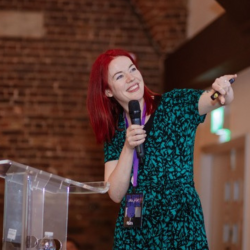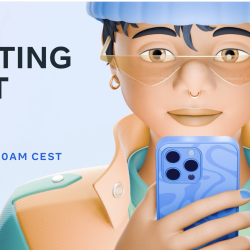A year ago I was sitting with my business partner in a ridiculous ‘must visit’ restaurant called Bacchanalia, surrounded by very beautiful people in togas, serving us extortionately priced, yet very average, tagliatelle. It was my birthday. She was treating me… and regretting the choice. The topic of generative AI had dominated the news for weeks, debates erupting about its potential to reshape society, and forecasts of widespread unemployment among the middle class. Yet we were musing on how everyone seemed oblivious, as if the extravagant, careless spending this restaurant epitomised wasn’t at risk. Fast forward twelve months and I feel the same lack of urgency within the marketing industry. Just last month (in March) Sam Altman, CEO of OpenAI, announced a startling prediction in what was relatively under-reported news.
‘(Artificial General Intelligence) will mean that 95% of what marketers use agencies, strategists, and creative professionals for today will easily, nearly instantly and at almost no cost be handled by the AI — and the AI will likely be able to test the creative against real or synthetic customer focus groups for predicting results and optimising.‘
And when asked for a time frame, he said within five years.
While the early rush of tools were often just fancy demo videos and a simple API call to ChatGPT 3.5, I sensed the inevitability of AI ripping a black hole through our industry last March. The efficiency improvements, cost reductions, automated research, analysis and reporting were too advantageous for any competitive industry to ignore for long.
While I appreciate that shouting ‘PANIC!’ on a sinking ship isn’t best practice, we’ve also got to stop simply rearranging the deckchairs. Especially for those of us at the small/middle end of agency scale. Because the networks haven’t been idle these last twelve months. Publicis Groupe has converted into an AI-charged software platform (at a cost of €300m). VCCP has set up an AI-only agency, Faith. Of MediaMonks’ 8,000 strong global team, 600 already work in their Monks.Flow AI-powered studio.
These R&D investments and business pivots are about to cause havoc to our industry
Why? Firstly, the walled gardens it might create. Publicis’ GenAI platform, ‘Charlie’, has been rolled out to Pfizer, overhauling their company’s entire marketing workbench. This type of platform builds a powerful bridge between agency and client, integrating agencies further than ever before into a client’s business and internal marketing and business transformation. The agency opportunities are surreal — unless you’re not the agency partner, and then a new barrier to entry has just been established.
Secondly, the pivot it requires to become a software company. In an industry traditionally oriented to human capital, the wholesale rebuilding of your business to centralise R&D, technical innovation and investment is novel, and uncomfortable. With investments in AI infrastructure, reshaping of teams and wholesale staff retraining, the energy required to survive is enormous, and one that small agencies will find difficult with fewer, less diversely-skilled talent, and shallower pockets. Add the challenge of top end technical talent attraction, and it’s difficult to see how the agency market won’t rapidly consolidate, to the detriment of its middle class.
Our agency has already taken action, having created and developed Platform12, a network of proprietary GenAI tools and partnerships with some exciting GenAI platforms, so I’m admittedly feeling less nervous than I might have been. There’s no certainty that will keep us relevant in this new world, but we try to hold onto the fact that at 100 people we’re agile, and can continue to keep pace as it unfolds. Plus our technical innovation has been home-grown, and with the democratisation AI offers we’re probably feeling more confident than some of our peers. But for those who haven’t taken action, look for partners to help get up to speed. There’s a powerful space for the ‘little guys’ to work together, much like the developer community does, harnessing an open source mentality. In parallel, you need to rapidly audit your business for weaknesses in the face of AI automation. Can/do you want to restructure? Do you have the technical talent onboard? If not, can you get it?
Let’s end on a less Robocop note
Marketing has always been a curiously human industry. Humans tell stories to other humans, to make them buy a product or service, with a couple of thousand stakeholders offering their opinion. The Don Draper ‘lightning bolt’ simplicity of advertising doesn’t exist. It’s an industry mired in committees, complex decision-making, data overload, and oceans of ineffective output — made a hundred times worse with the advent of digital.
Will we all truly be willing to let AI get on with it? I doubt it. We’re like moths to the flame. People will want to stay close to the stories their businesses tell. But pretending it’s not rapidly coming down the road could be catastrophic.
Featured image: Anna Tarazevich / Pexels































